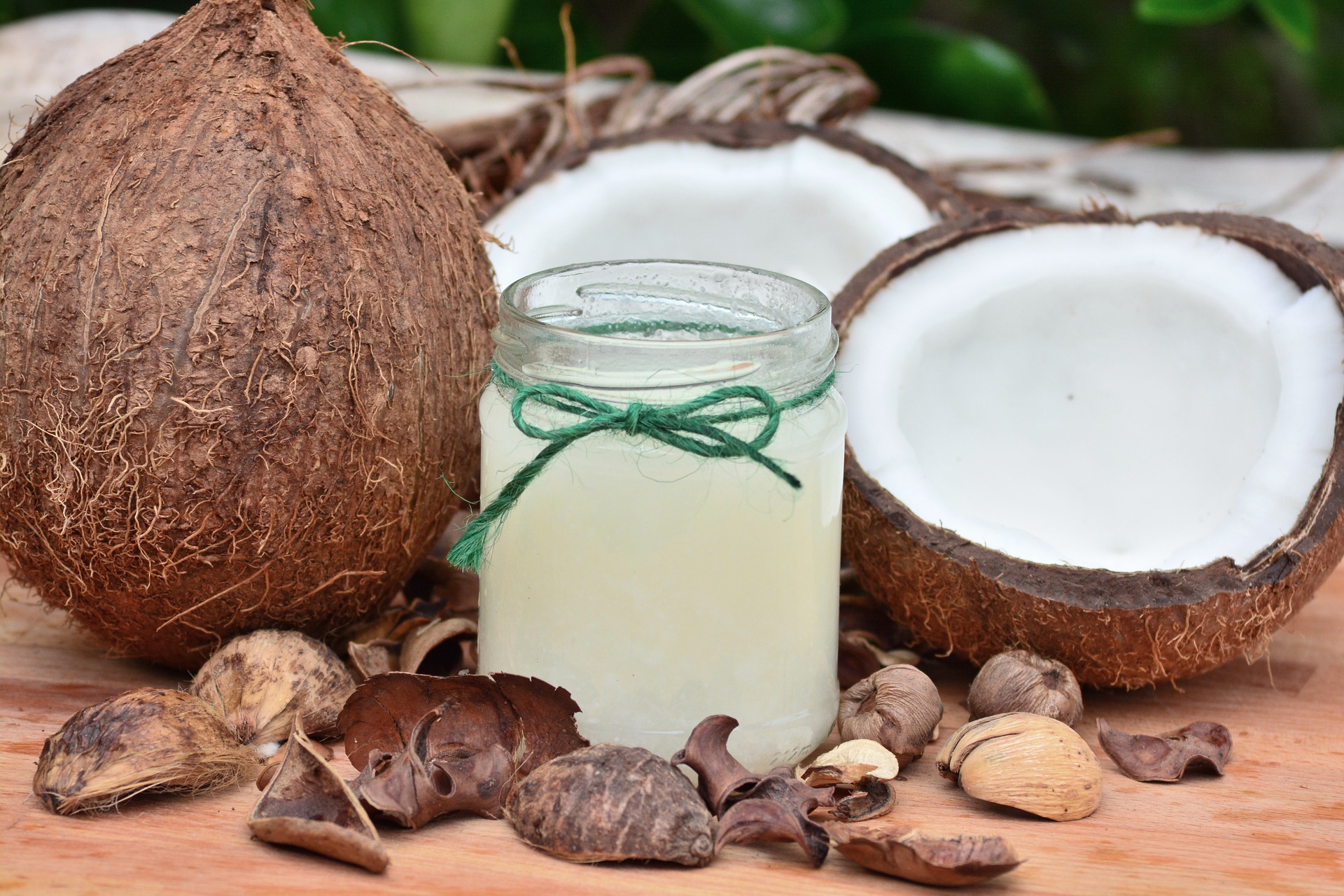Table of Contents
How Coconut Oil Could Help You Naturally Treat Psoriasis

Psoriasis is a skin condition that affects millions of people. It can be difficult to find relief from psoriasis, but coconut oil could help! Coconut oil has been used for centuries as an all natural treatment for psoriasis and other skin conditions. Not only does it have the power to soothe irritated and inflamed skin, but it also contains lauric acid which strengthens immunity against infection-causing microorganisms. In this blog post we will explore how coconut oil might work in your journey towards finding psoriatic relief!
Coconut oil is made up of medium-chain fatty acids that help heal skin and reduce inflammation
Coconut oil is made up of medium-chain fatty acids that help heal skin and reduce inflammation. It’s also great for cooking because it has a high smoke point, and its light flavor enhances the taste of food!
Coconut oil might be so popular today due to all these reasons; coconut milk in coffee with grass fed butter (or ghee), munching on some salt free chips topped with guacamole or salsa – yum!
The benefits of coconut oil stretch beyond skin care.
A study published in the Journal of Clinical and Diagnostic Research found that lauric acid, a type of fatty acid present in significant amounts in coconut oil, strengthens immunity against infection-causing microorganisms like bacteria or fungi which can lead to psoriasis flare ups.
Coconut fiber Coconut fiber is a natural dietary supplement that can decrease the severity of psoriasis flare ups. It increases the absorption and effectiveness of medications for skin conditions by trapping them in its rich fatty acid content, preventing their degradation thanks to oxidative processes.
Apply coconut oil directly to the psoriasis patches for relief from itching, pain, and redness
Psoriasis can be incredibly difficult to live with because it often triggers intense itchiness due to dryness or irritation caused by rubbing against clothes or other materials during day-to-day activities like sitting down in your car seat on your way home after work.
Luckily there’s something you can do about all these symptoms! Simply apply some organic virgin coconut oil directly onto any patches of psoriatic plaques and enjoy immediate comfort thanks not only its moisturizing properties but also anti-inflammatory effects which are recognized as a viable treatment by the National Psoriasis Foundation.
If you’d like to know more about psoriatic plaques, how to get rid of them or if coconut oil can help with psoriasis then be sure to read on!
Make a natural scrub by mixing equal parts coconut oil and baking soda in a bowl with water.
Invest in a jar of coconut oil and baking soda, mix them together with water to create the perfect natural scrub. You don’t have to worry about all those nasty chemicals that are lurking on your counters anymore!
Plus you can use it for lots more than just cleaning! If you’re looking for an all-natural way to treat itchiness, then coconut oil is worth a try. Psoriatic plaquette can be hard to get rid of and no one wants itchy skin!
Does coconut oil have any healing properties?
You’ll need to do a bit of research before you jump right in. But if you decide that the benefits are worth it, then all you need is one tablespoon of coconut oil for each use and apply it directly to your skin twice daily. Psoriasis natural treatment which includes using coconut oil can give relief from psoriatic plaques and help with psoriasis!
Coconut Oil for Psoriasis: Natural Treatment
Mix equal parts baking soda in a bowl with water – Add two tablespoons of unrefined virgin organic coconut oil (smell should be fresh) Stir mixture into paste consistency with spoon or fingers until fully mixed together;
Can coconut oil help with psoriasis?
It turns out, coconut oil is good for more than just cooking. Coconut skin care products are all the rage nowadays and it’s not hard to see why! Not only does this natural product moisturize dry hair and skin but also help with psoriasis because of its ability to hold in moisture.
One way you can use your jar of deliciousness as a scalp treatment is by rubbing some into your hands then running them through wet strands before washing off (as if shampooing). Dabbing a small amount on areas that need extra hydration may be another option too.
Not many people know that coconut oils aren’t just used for cooking – they’re great beauty treatments, too! They can moisturize dry hair and provide relief from common.
What is the best coconut oil for psoriasis?
Virgin cold-pressed coconut oil (VCO) is an interesting and healthy alternative to other cooking oils, on top of its benefits for your skin. Full of nutrients like manganese, iron and zinc – VCO can moisturize, nourish hair or even clean dishes!
Can coconut oil make psoriasis worse?
Coconut oil has a long history of use for health and beauty. It is unlikely to make psoriasis worse, but may not be effective in everyone’s case. Some people who are allergic will have an adverse reaction during first application so it should be stopped immediately if you notice the condition worsen after applying coconut oil on your skin.
How can I boost my immune system to fight psoriasis?
A healthy diet can provide you with the nutrients that help boost your immune system, but one of those many essential vitamins is found in a surprising plant: salad greens. These veggies are not only tasty and great for weight loss; they also contain rich amounts of calcium which helps protect against osteoporosis! You could add these leafy greens to any meal (salad, soup) or snack on them raw as part of an afternoon pick me up.
Salads aren’t just delicious side dishes – some vegetables have hidden health benefits too! Salad greens like spinach and kale might seem innocent enough at first glance because it’s something we eat every day without giving much thought about what else it contains besides romaine lettuce or iceberg lettuce leaves.
Does coconut oil get rid of itchiness?
Psoriasis plaques are often itchy and painful. They can be managed with conventional treatments, but some people claim that they have found relief through the use of coconut . However, there is no scientific evidence to support this as an effective treatment or cure at present time.
How can I stop psoriasis itching?
In order to relieve the itch, dermatologists give their patients eight fantastic tips. The best way to get rid of an itchy psoriasis is by treating your disease and removing scales from the affected area with a loofah sponge.
Try not showering for long periods of time in hot water because that will only make things worse! Be sure to moisturize properly so you don’t scratch at those painful rebuild too much- instead try using ice packs or cooling gels like menthol cream which can help cool down your skin without irritating it further.
Why is my psoriasis spreading?
Psoriasis is a chronic skin condition that in some cases can spread to other areas of the body. A family history, having another immune system disorder, smoking and trauma to the skin are all additional risk factors for psoriasis spreading. Exposure to many triggers might also cause it
Does psoriasis itch more at night?
Some young people find it difficult to sleep due to the itchiness and other symptoms caused by their psoriasis. Sometimes they scratch themselves during the night, which is painful and causes bleeding.
How do you use coconut oil for itchiness?
A quick and simple way to help psoriasis is by using coconut ! It may be a little messy, but it can make your scales much more manageable. Just scoop some of the thick oil out on top of your head (you should focus this treatment around scaly areas) then rub in any excess onto other dry or irritated patches.
Wrap you scalp with towel or shower cap for 30-60 minutes before rinsing off all oils from hair and skin – don’t worry if there are flakes still left behind because they will eventually fall away naturally thanks to the moisturizing properties found within coconuts.
Can coconut oil cause itching?
As a tree nut, coconut oil can cause an allergic reaction in those are already sensitive to nuts or have allergies. When applied topically it could appear as itchiness, red bumps and/or persistent rash that does not clear up.
How good is coconut oil for psoriasis?
Coconut is a wonder cream that can also help soften and loosen the scales before itchiness medications. Start by applying coconut oil to your skin as often as possible, then use topical steroids which are typically more effective when scaling has been softened beforehand.
Does psoriasis spread quickly?
Rawness can be caused by a variety of reasons. One type is erythrodermic rawness which spreads over much of the body and causes bright red reinforcement to develop on top. This form tends to spread quickly across the skin, often in cycles with periods where it improves or worsens for no discernible reason.
If you are experiencing this sort of rapid spreading that leaves your skin completely covered in blood-red rebuild then please see a doctor immediately as they will know how best to treat it!
How do you calm down a psoriasis flare up?
You know how you get those irritating little skin blaze-ups every now and then? Well, there are a few simple tweaks to your daily routine that can promote healing. Keep it moisturized – one of the most effective things you can do for irritated skin is keep it moist!
Soak up some sun rays too; they’re great for soothing dry rebuild on your face or giving acne scars more time to heal. And don’t spend all day scratching at yourself like an animal in heat: let’s try not picking up any new infections as we go about our days (aka no smoking).
Remember though: if something doesn’t seem right with what I’m suggesting here, make sure to consult a doctor before changing anything drastic such as dieting.
What organs can be affected by psoriasis?
Itchiness is a chronic condition that flares up for no apparent reason. The overproduction of white blood cells causes inflammation in the dermis and other parts of the body including lungs, joints, or digestive system.
Symptoms can include itchy patches on your elbows or knees which eventually break open to reveal red scaly patches underneath after being scratched too much; dry flaky areas around hairline; thickened plaquette with silvery scales covering large portions of limbs.
How often should you shower with psoriasis?
Rawness can make your skin dry and easily irritated. This is complemented by the fact that bathing or showering too much will only increase this issue, making it difficult to properly care for itchiness dermis.
To avoid these issues with frequent baths or showers, dermatologists recommend following their eight tips: take at most one bath a day; use non-soap cleansers such as lotion based soaps instead of soap because they are gentler on the dermis (better yet, don’t even wash off sweat); if you must bathe more than once in a day time limit yourself to 15 minutes while using gentle water pressure and adding moisturizers afterward.Psoriasis makes your dermis dry and easily irritated which may be exacerbated.







